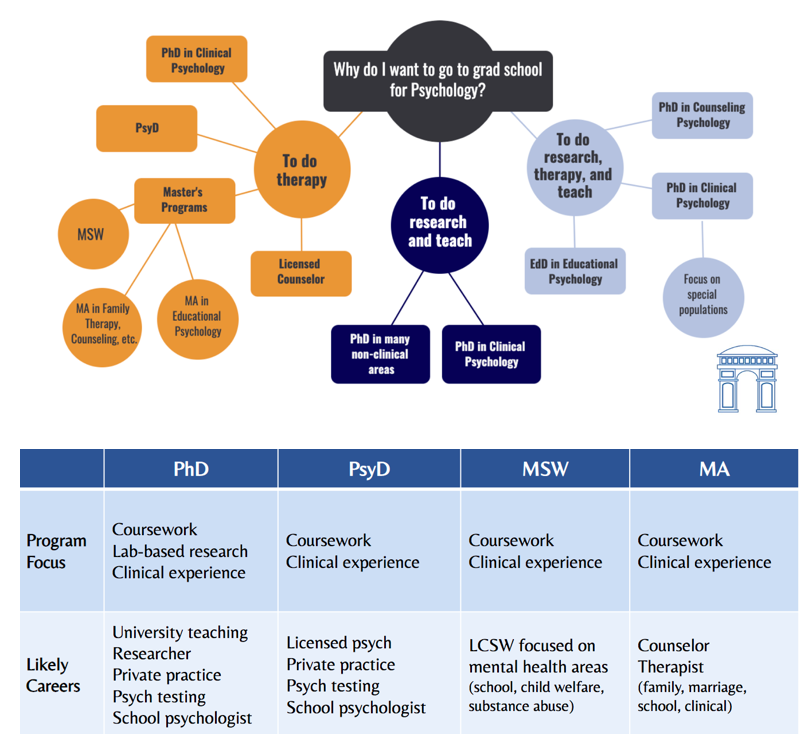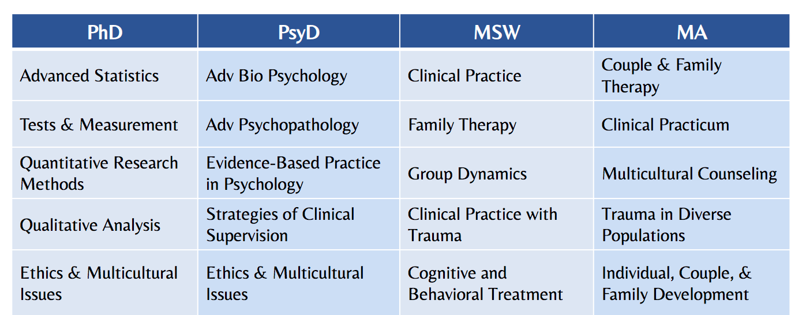Are you considering a career in psychology, whether as a clinician, researcher, professor, or all three? If so, there are many choices when pursuing graduate school, including which degree and specialty area are best for you. The four main degree options in the field of psychology are:
- Doctor of Philosophy, or PhD
- Doctor of Psychology, or PsyD
- Master of Social Work, or MSW
- Master’s Degree, or MA
Below, we’ll walk through how to identify your desires for graduate school and the career that will follow, as well as the differences among these four degrees.
Identify your broad academic and professional goals first
Your ultimate professional goals are the most important factor in deciding which degree to pursue. Start by asking yourself some questions:
- What interests me about psychology?
- What are my career goals: do I want to provide psychological therapy, conduct research, teach at a university, work in a school or organization, or some combination?
- In graduate school, how much do I want to conduct research versus gain clinical experience?
- How many years do I want to spend in graduate school for psychology?
PhD programs are heavily research-focus; PsyD programs include research, but to a lesser degree; and research plays a minimal role in MSW and MA degrees. So if you want to conduct research and teach at a university, consider going the PhD route, either in clinical psychology or in a non-clinical area such as cognitive neuroscience. A PhD in clinical or counseling psychology is your best bet if you want to be a therapist, conduct research, and teach. Whereas PhD and PsyD degrees require that students write a dissertation – consistent with their greater research focus – MSW and MA programs do not have this component. As a result, while it takes 5-8 years to earn a PhD and 4-6 years to earn a PsyD, an MSW or MA degree typically take only 1-2 years.
If you want to focus on being a clinician, though, a PsyD and many Master’s programs can get you there. So can a PhD, but if you’re not interested at all in conducting research in addition to practicing as a therapist, it might be an unnecessary investment of your time and energy. If you want clinical experience during your program in the form of practicums and internships, these will be built into the curriculum of PhD and PsyD programs. At Stanford’s PsyD program you will conduct about 2000 hours in practicum in years 2-4, and another 2000 hours in internships in your final year. In contrast, MSW and MA programs will typically involve fewer than 20 hours of fieldwork.
Consult the charts below to help you sort out which of the four types of programs would make most sense for you, based on your career goals:
Next, drill down into your specific career interests
Once you’ve identified the balance you desire among clinical work, research, and teaching, it’s time to drill down into the specifics of your interests. Are there subject areas, populations, and/or disorders that you feel most compelled toward? The four types of programs offer different types of coursework, illustrated in the chart below:
If you want to focus on research, but are specifically interested in psychology as it’s practiced, a PhD in clinical psychology may be right for you. However, if your research interests fall outside the realm of clinical work, a PhD in a different subject area would make the most sense. As far as the Master’s degrees go, the MSW is more practical and less academic. And the MA degree may provide just enough training for the kind of counseling you’d like to provide… and may even be a steppingstone to a PhD program.
Specialty Areas
The more clearly you’ve defined your interest area(s), the better you’ll be able to determine not only which of the four types of programs makes the most sense for you but also, within that category, which specific programs will be the most fruitful match. There is a wide range of specialties you can pursue, from those involving the individual and relationships (like developmental psychology, or marriage and family psychology) to the intersection of psychology and biology (like neuroscience, or cognition and perception) to school-related areas (like educational psychology or educational testing) to a variety of additional areas (like public policy, substance abuse, industrial-organizational psychology, and more). You may also have a preference for working with certain demographics, such as immigrants or the underserved.
Each grad program has a unique combination of concentrations or tracks. As an example, Harvard University offers psychology PhD students a focus in one of four areas: experimental psychotherapy and clinical science; developmental psychology; social psychology; or cognitive, brain, and behavior. At Rutgers University, PsyD students can complete programs in clinical psychology, school psychology, or organizational psychology. At Columbia University, the MSW program has a variety of specific fields of practice for students to choose from, including aging; contemporary social issues; and family, youth and children’s services. And Pepperdine University’s Master’s degree in psychology focuses on marriage and family therapy.
Consider personal factors
Beyond the broad and granular outlines of the career you envision for yourself, there are personal factors and preferences to consider that will help you narrow down which schools to apply to and, ultimately, which program to choose. For example, consider geography: are you committed to moving to or staying in a particular city —or, conversely, unwilling to move to a certain geographic area for school? What size program do you think would help you thrive – a smaller program with more personalized attention or a larger program with more options of courses? There’s cost to consider, as well: while PhD programs are usually fully funded, PsyD, MA, and MSW programs are not. What are your financial capacities right now?
Research individual programs carefully to decide where to apply. The specifics of what a program offers—and demands—are far more important than a school’s ranking!
Finally, apply!
Once you’ve narrowed down the type of graduate school you want to apply to, as well as the specific programs that best suit your interests and goals, it’s time to put together your application. The application process will differ based on whether you’re applying to PhD, PsyD, MSW, and/or MA programs, but here are the general components you may encounter.
Quantitative application components:
- Undergraduate transcript.
- Undergraduate GPA.
- GRE general test. The GRE general test has three sections—verbal reasoning, quantitative reasoning, and analytical writing—and takes nearly four hours to complete. Before Covid, the GRE was required for PhD and PsyD programs, but typically not for Master’s programs, with certain exceptions. As a result of Covid, many PhD and PsyD programs (see Harvard for one example) have made GRE scores optional. You can access sample questions via the ETS website.
- GRE subject test in psychology. The GRE psychology test, which consists of about 205 multiple-choice questions, takes nearly three hours to complete. The test is required by some programs, especially clinical psychology programs focused on research. You can access a practice book via the ETS website.
Qualitative application components:
- Letters of recommendation. Usually, three are required. Programs may mandate that a portion of these letters be from individuals in certain categories, like academic or professional; Columbia’s MSW program, for example, requires that at least one, and preferably two, of the three recommendation letters be from faculty members at your college. Such requirements differ by program rather than degree, so make sure to carefully check the website of every program you’re applying to.
- Personal Statement. Unlike personal essays for college, which can focus on any especially meaningful aspect of your experiences, your graduate school Personal Statement should focus on your life as it relates to your career aspirations. This essay should be autobiographical and retrospective, and take the shape of a story.
- Statement of Purpose. In your Statement of Purpose, drill down into your academic interests and future plans. This essay should be more specific, technical, research-based, and goals-focused than your Personal Statement. Here, you’re looking forward rather than backward, explaining why you are applying to grad school and being explicit about your qualifications for acceptance. For PhD programs, we recommend focusing on your research goals over your clinical goals. Read more about the difference between the Personal Statement and the Statement of Purpose in our previous post.
- Resume or CV. You may be asked to submit a resume outlining your educational, extracurricular, and work history; in certain cases, a curriculum vitae, or CV, will be warranted. The difference between a resume and a CV is one of degree. Typically, a resume is limited to 1-2 pages, while a CV is unlimited in length and is often more comprehensive. For more details on the difference between a resume and a CV, see our previous post, here.
- Depending on the program, an interview may be required. Nova Southeastern University’s PsyD program in clinical psychology, for example, extends on-campus interviews to a select group of promising candidates.
An important note: for many programs, you must have amassed substantial clinical experience—that is, experience working directly with patients—before you apply. For PsyD and especially PhD programs, you also must have accrued experience conducting original research. Your resume or CV and your essays are the best places in your application to explain both the extent of your clinical and/or research experience, and how it’s impacted your goals.
For more information about the path to psychology graduate school, join us for our presentation, How to Decide Between a PhD in Psychology, PsyD, or MSW on Wednesday, October 12th at 6-7pm EST.
Feel free to schedule a complimentary consultation to learn about our admissions consulting services. Whatever your question, Collegiate Gateway is happy to help!



